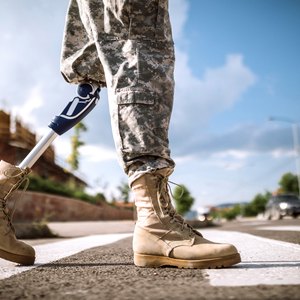
Generally, the Department of Veterans Affairs awards disability compensation for service-related injuries or illnesses to compensate for the increased difficulty that disabled veterans have in finding gainful employment. The qualification process is long, and it can on average almost 80 days or more to get a ruling from VA officials on your disability. Many veterans long to return to the profession of arms, however, and even disabled veterans will occasionally seek to return to active duty.
Active Duty and Disability Compensation
Generally, you cannot collect disability compensation while on active duty. If you are currently collecting disability compensation from the VA, you must notify them when you return to active duty. You do not lose your disability rating, however. And if you are still disabled after being discharged again, you may again qualify for disability compensation just as before.
Restarting Disability Pay
After your next active duty hitch, you can simply notify the Department of Veterans Affairs that you are no longer on active duty. They will restart your benefits. Any disabilities you had from before are still service connected, just as they were from before. You do not have to submit a brand new disability application, but if you claim new medical issues, you should forward any documentation concerning those medical issues and any disabling effects.
Retirement Pay and Disability
Prior to 2004, veterans on the Retired List who qualified for disability compensation had to forfeit part of their military pensions in order to collect disability compensation. The prohibition on "double-dipping" no longer applies, however and military retirees may now collect their military pensions and their disability compensation. This means that if you are disabled, but still able to return to active duty, and you are reasonably close to qualifying for military retirement, you have all the more reason to put the uniform back on.
Disability Amounts
If you are a veteran with a comparatively minor disability, giving up disability compensation pay may not be a big deal: If you have a 10 percent disability, your monthly disability compensation would be just $142.29 per month. At 20 percent, the payment is $281.27.
However, the monthly disability payment is more substantial at higher levels of disability. As of 2020, 70 percent disability compensation payment to a married veteran without children brings in $1,547.17. Having to take care of one or more parents and having one or more dependent children can also cause the compensation amount to increase.
For example, at 70 percent disability, a married veteran taking care of one parent would receive $1,644.17 monthly, and a married veteran with one child would receive $1,636.17 monthly. There are also added amounts for:
- Each additional child under 18 ($60)
- Each child over 18 enrolled in a qualifying school program ($194)
- A spouse receiving Aid and Attendance ($111).
References
Resources
Writer Bio
Leslie McClintock has been writing professionally since 2001. She has been published in "Wealth and Retirement Planner," "Senior Market Advisor," "The Annuity Selling Guide," and many other outlets. A licensed life and health insurance agent, McClintock holds a B.A. from the University of Southern California.

